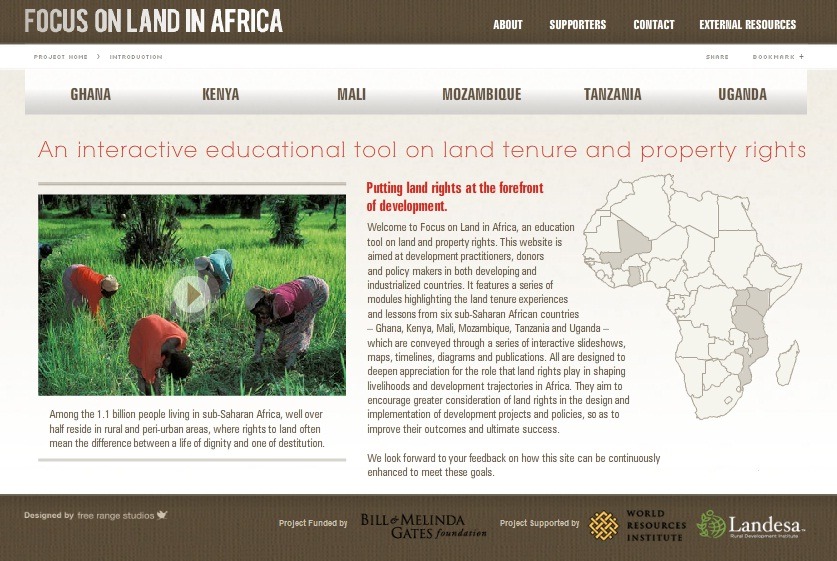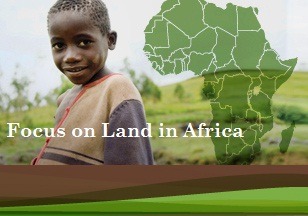By Anna Knox and Peter Veit
Regardless of what matters to you – access to education, universal food security, strengthening women’s rights, or a healthier environment – land rights plays a key role in achieving these goals.
When people have secure access to land, it can lead to:
- Economic development through increased agricultural productivity,
- Improved childhood nutrition,
- Increased school attendance and investments in basic education,
- Increased environmental stewardship,
- Reduced potential for social instability and conflict,
- Reduce vulnerability to domestic violence
 Focus on Land in Africa, a recently launched web-based tool focused on sub-Saharan Africa, aims to help policymakers and practitioners understand the links between land rights and critical development outcomes. Designed by World Resources Institute and Landesa as an online education tool, the site is interactive and uses slideshows, timelines, maps, videos and more in order to appeal to and engage users. Currently, the tool features lessons drawn from six sub-Saharan African countries: Ghana, Kenya, Mali, Mozambique, Tanzania, and Uganda. These lessons were developed with funding support provided by the Bill & Melinda Gates Foundation. More countries will be featured as the tool grows.
Focus on Land in Africa, a recently launched web-based tool focused on sub-Saharan Africa, aims to help policymakers and practitioners understand the links between land rights and critical development outcomes. Designed by World Resources Institute and Landesa as an online education tool, the site is interactive and uses slideshows, timelines, maps, videos and more in order to appeal to and engage users. Currently, the tool features lessons drawn from six sub-Saharan African countries: Ghana, Kenya, Mali, Mozambique, Tanzania, and Uganda. These lessons were developed with funding support provided by the Bill & Melinda Gates Foundation. More countries will be featured as the tool grows.
The education tool helps connect the dots between in-depth research and what gets filtered onto the front page of our newspapers now and then. How are the conflicts between herders and farmers in Mali connected to land rights? How are some women in Ghana using customary rules to gain greater control over land? Do villagers in Tanzania have legal rights to land that they do not have title to? Is the expansion of biofuels threatening people’s land rights in Africa? The site deepens understanding of these critical issues beyond what a simple newspaper or magazine article can convey, but without having to wade through dense research reports and complex language.
The transformational nature of access to land and secure rights to land has been illustrated by land to the tiller programs in Japan, Taiwan and South Korea, which were instrumental in spurring economic development after World War II. More recently, a number of tenure reforms have been implemented in sub-Saharan Africa, in such countries as Burkina Faso, Mozambique, and Tanzania. Increasingly, African governments are ackn0wleding the importance of legally recognizing the land rights of communities who have farmed, herded, lived on and otherwise depended on the land and its natural resources for years. In the wake of these promising changes, sharing lessons of experience is critical to nurturing new land reform efforts and continuously improving current strategies. The tool supports this sort of cross-fertilization.
 NGOs working in the fields of maternal health, children’s nutrition, education, women’s rights, and the environment can increase the effectiveness of their work when they understand the role of land tenure and integrate this thinking into their own poverty alleviation approaches. Often dismissed as too complex, land tenure issues are regularly overlooked by other development sectors. This web-based tool helps untangle the complexity by presenting the issues in lesson formats tied to real-life challenges and solutions.
NGOs working in the fields of maternal health, children’s nutrition, education, women’s rights, and the environment can increase the effectiveness of their work when they understand the role of land tenure and integrate this thinking into their own poverty alleviation approaches. Often dismissed as too complex, land tenure issues are regularly overlooked by other development sectors. This web-based tool helps untangle the complexity by presenting the issues in lesson formats tied to real-life challenges and solutions.
Focus on Land in Africa is meant to be a free educational resource for development practitioners, policymakers, students, researchers, academics and other audiences interested in learning more about the intersection between land rights and international development issues.
Comments on the Focus on Land in Africa tool and on this blog post are welcomed.
Anna Knox is the senior director of Africa Programs at Landesa, a non-governmental development organization working to secure land rights for the world’s poorest people.
Peter Veit is the project manager for the Equity, Poverty and Environment Initiative at World Resources Institute (WRI). WRI is a global environmental think tank that goes beyond research to put ideas into action, working at the intersection of environment and human needs.